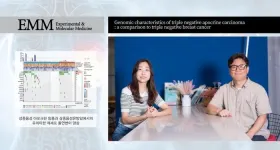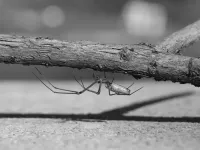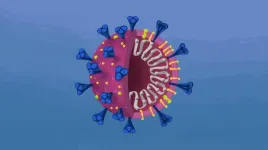(Press-News.org) IIASA is proud to announce the launch of its Flagship Report, "Systems Analysis for Sustainable Wellbeing. 50 Years of IIASA Research, 40 Years After the Brundtland Commission, Contributing to the Post-2030 Global Agenda” on Wednesday, 13 September 2023 at an official UN event in the framework of the 78th session of the UN General Assembly and the Sustainable Development Goals mid-term review.
The IIASA Flagship Report chronicles the extraordinary 50-year journey of IIASA, a globally renowned institute providing systems analytical expertise on complex global challenges. Co-sponsored by the Permanent Missions of Austria and South Africa to the UN and supported by the Department of Science and Technology of South Africa, this event is set to unveil crucial insights from the report. Notably, the publication features a foreword contribution by H.E. Alexander Van der Bellen, the Federal President of the Republic of Austria, who has been a steadfast supporter of IIASA and its research initiatives.
The event will bring together policymakers, scientists, and representatives from various sectors to discuss the report's key aspects and the importance of advancing the 2030 Agenda. Several leading IIASA researchers and high-level collaborators including Csaba Kőrösi, President of the 77th session of the UN General Assembly; Alexander Marschik, Permanent Representative of Austria to the UN, Sepo Hachigonta, Director of Strategic Partnerships, National Research Foundation of South Africa; Nyovani Janet Madise, Director of Research for Sustainable Development Policies and Head of the Malawi office, African Institute for Development Policy (AFIDEP); and Adil Najam, President of WWF International, will participate as speakers.
The report places significant emphasis on the 2030 Agenda, its 17 Sustainable Development Goals, and the imperative to achieve sustainable wellbeing for all. As we approach the mid-term review point, the report offers a comprehensive perspective on the interconnected challenges and opportunities we face, aligning with the overarching theme of the 78th session of the UN General Assembly, titled “Rebuilding trust and reigniting global solidarity”. This is especially relevant as we find ourselves at the beginning of a new phase of accelerated implementation of the 2030 Agenda, which is being called for in the draft political declaration to be approved at the session.
The report is organized into six parts, summarizing past and current IIASA research highlights and pointing toward future challenges and solutions. In the final chapter, the authors offer three critical policy messages to stimulate discussions about a post-2030 Agenda for Sustainable Development:
Suboptimization is suboptimal: Mainstream a systems-analysis approach into policymaking at all levels to ensure that broader, longer-term considerations are incorporated.
Enhance individual agency: Provide equal access to quality primary and secondary education for all, and in particular for women, as a means of promoting gender equality and empowerment.
Strengthen collective action and global governance: Harness global cooperation and representation to support the global commons.
With its international credibility, neutrality, and systems science approach, IIASA stands as a vital resource in addressing global challenges and fostering cooperation between diverse communities on matters of shared concern. As the institute enters its sixth decade, it remains steadfast in its commitment to advancing integrated systems science to ensure sustainable wellbeing for all.
"This report is a testament to the unwavering dedication of IIASA to addressing global challenges for the past five decades and its commitment to continue to do so. It showcases our evolution from a cooperative scientific venture during the Cold War to a global institute at the forefront of solving humanity's most pressing issues today," notes IIASA Interim Deputy Director General for Science, Wolfgang Lutz.
Shonali Pachauri, who leads the Transformative Institutional and Social Solutions Research Group at IIASA, highlighted the report's relevance to ongoing global efforts, saying, "IIASA's integrated systems approach and international credibility makes it an invaluable asset in addressing the interconnected global challenges we face today. From climate change to biodiversity loss and pandemics, IIASA's work is more critical now than ever."
Join us online on 13 September 2023, from 15:00-16:00 CEST for this momentous occasion, as we celebrate 50 years of IIASA's pioneering research and its commitment to ensuring sustainable wellbeing for all.
For further information on the launch event and to register to attend, please visit: https://iiasa.ac.at/events/sep-2023/iiasa-flagship-report-launch
Reference
Lutz, W., & Pachauri, S. (Eds.) (2023). Systems Analysis for Sustainable Wellbeing. 50 Years of IIASA Research, 40 Years After the Brundtland Commission, Contributing to the Post-2030 Global Agenda. International Institute for Applied Systems Analysis (IIASA), Laxenburg, Austria. DOI: 10.5281/zenodo.8214208
END
Illuminating the path to sustainable wellbeing
2023-09-13
ELSE PRESS RELEASES FROM THIS DATE:
Study finds that state-mandated civics test policy does not improve youth voter turnout
2023-09-13
Washington, September 13, 2023—The United States has the largest age gap in voter turnout among advanced democracies. Youth voter turnout remained low, at 48 percent, in 2020. Scholars, educators, and policymakers often recommend civic education as a solution to low youth voter turnout.
However, new research finds that a commonly used state-mandated civics test policy—the Civics Education Initiative (CEI)—does not improve youth voter turnout, at least in the short term. The study, by Jilli Jung and Maithreyi Gopalan, both at Pennsylvania State University, was published today in Educational ...
Groundbreaking research unveils genetic characteristics and improved prognosis of triple negative apocrine carcinoma
2023-09-13
Breast cancer research takes a significant stride forward as Professor Semin Lee and his research team from the Department of Biomedical Engineering at UNIST, in collaboration with Professor Ji-Yeon Kim and Professor Young-Hyuck Im from the Division of Hematology-Oncology at Samsung Medical Center in Seoul, delves into the exploration of triple negative apocrine carcinoma. This rare breast cancer subtype has garnered attention due to its unique genetic characteristics and improved prognosis when compared to other forms of triple-negative breast cancer (TNBC).
Triple negative ...
Inflammatory signs for adolescent depression differ between boys and girls
2023-09-13
New research led by the Institute of Psychiatry, Psychology & Neuroscience (IoPPN) at King’s College London has found that depression and the risk of depression are linked to different inflammatory proteins in boys and girls.
When inflammation occurs in the body a host of proteins are released into the blood called cytokines. Previous research has shown that higher levels of cytokines are associated with depression in adults, but little is known about this relationship in adolescence.
Researchers investigated sex-differences in the relationship between inflammatory proteins and depression. Published in the Journal of ...
The effect of crowdsourcing contests on a company's stock and the idiosyncratic risks they create for investors
2023-09-13
Researchers from University of Colorado Denver, Iowa State University, and Arizona State University published a new Journal of Marketing study that examines the stock market effects on these contests and the contest characteristics that may enable such contests to pay off.
The study, forthcoming in the Journal of Marketing, is titled “When Do Marketing Ideation Crowdsourcing Contests Create Shareholder Value? The Effect of Contest Design and Marketing Resource Factors” and is authored by Zixia Cao, Hui Feng, and Michael A. Wiles.
Crowdsourcing contests for marketing ideas such as new ads, graphics, and products have become quite popular ...
Some spiders can transfer mercury contamination to land animals, study shows
2023-09-13
Sitting calmly in their webs, many spiders wait for prey to come to them. Arachnids along lakes and rivers eat aquatic insects, such as dragonflies. But, when these insects live in mercury-contaminated waterways, they can pass the metal along to the spiders that feed on them. Now, researchers reporting in ACS’ Environmental Science & Technology Letters have demonstrated how some shoreline spiders can move mercury contamination from riverbeds up the food chain to land animals.
Most mercury that enters waterways ...
National awards recognize 19 students, schools, and educators’ commitment to health
2023-09-13
DALLAS, September 13, 2023 — On Tuesday, Sept. 12, the American Heart Association, a global force for healthier lives for all, recognized 19 students, schools and educators for their commitment to end cardiovascular disease, the nation’s no. 1 killer, through the Association’s in-school programs, Kids Heart Challenge™ and American Heart Challenge™. The annual National Awards Ceremony, held virtually, was joined by program participants from coast to coast and ...
American Society for Microbiology announces ‘gain of function’ recommendations from top scientists
2023-09-13
Washington, D.C. — Sept. 13, 2023 — The American Society for Microbiology today released consensus recommendations from a workshop of leading scientists who reviewed the benefits and risks of “gain of function” research, as well as related policies and procedures, and proposed a foundation to guide discussions and improve oversight moving forward.
The recommendations – together with a call to action for the scientific community and the general public – are intended to inform assessments of “gain of function research of concern,” which makes up a small fraction of all biological research. ...
Scientists uncover COVID’s weakness
2023-09-13
New UC Riverside research has revealed COVID’s Achilles heel — its dependence on key human proteins for its replication — which can be used to prevent the virus from making people sick.
In a new paper published in the journal Viruses, the UCR research team describes an important discovery. The protein in COVID that enables the virus to make copies of itself, called N, requires the help of human cells to perform its job.
Genetic instructions in our cells are transcribed from DNA to messenger ...
UMass Amherst and Embr Labs develop ‘digital drug’ to predict hot flashes
2023-09-13
Researchers at the University of Massachusetts Amherst’s Institute for Applied Life Sciences (IALS) and Embr Labs have created a machine-learning algorithm to predict a hot flash before a person perceives it.
When combined with Embr Labs’ patented wearable device, Embr Wave™, immediate cooling is delivered to mitigate or fully alleviate the event. This first-of-its-kind predictive algorithm is the result of machine learning being applied to the largest data set of digital biomarkers for hot flashes ever collected, which was generated by researchers at UMass Amherst’s Center for Human ...
Socioeconomic status may be an uneven predictor of heart health
2023-09-13
Research Highlights:
The benefits of four measures of socioeconomic status (education, income, employment status and health insurance) on ideal heart health were greater for non-Hispanic white adults compared to Black, Hispanic and Asian adults in the U.S.
The new diverse representative study suggests heart disease prevention efforts should address other non-biological factors that drive cardiovascular health and not rely solely on reducing socioeconomic disparities by race or ethnic group.
Embargoed until 4 a.m. CT/5 a.m. ET Wednesday, Sept. 13, 2023
DALLAS, ...



